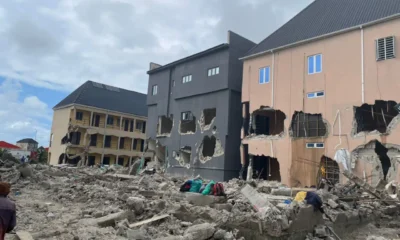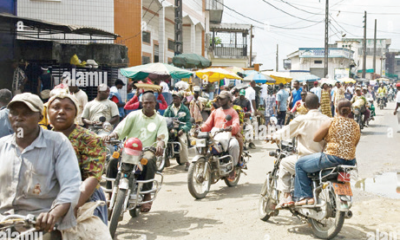News
Lagos Is Now For The Elites, Not The Masses, How True?
BY CAMI EZENWA & RAFIAT ABDULKAREEM
Despite accommodating all classes and tribes of persons, is Lagos, the commercial capital of Nigeria tactically being turned into a place for the elites alone?
Well, this is the contention of some Nigerians who spoke to The Eagle reporters in interviews recently.
As controversial as this may sound, the respondents cited a number of examples to back their argument insisting that the undertone of some of the polices of the Lagos government in the recent, is that common men should ship out.
The most nagging of the lot is the restriction order placed on two critical means of commercial transportation in the city – motorbikes and tricycles.
The Lagos State Government had January 26, banned the operation of commercial motorcycles, popularly called Okada, and tricycles, known as Keke Napep, in some Local Government Areas, bridges, and highways in the state.
The State Government directed security operatives to embark on total enforcement of the State’s Transport Sector Reform Law of 2018 on the affected six Local Government Areas, nine Local Council Development Areas and 10 major highways across the State with effect from February 1.
The ban also affects Opay and Gokada operators.
In their reactions, some residents who spoke to The Eagle correspondents said the present government was trying to turn Lagos to a place for elites alone, saying this was having negative impacts on the people.
One of them, Mrs. Tosin Oseni, a boutique owner in Ikorodu lamented that the ban on Okada has really affected her business because she used Okada to make deliveries to various areas in Lagos.
According to a resident in the LASPOTECH area, who simply identified himself as Mr. Musa, ‘’ this present administration is for the elites not for the masses, reason being that Okada , the easiest and fastest means to convey people and goods from one place to another has been banned”.
Even when there is traffic, Okada is the fastest means to get to one’s destination quickly.’’
Mrs Oluchi Ibe, a housewife on Awoseyin Street, Shomolu, said the ban was callous because it did not consider people who did not have cars.
“What of people who go to areas where there are no commercial buses, how will they cope?”, she asked, adding that since the ban, picking up her children from school had become difficult.
“Before, you will quickly get to school to pick the children, but now, either you trek down, or wait endlessly for buses, and this is not convenient”, she said.
Mr Shalom Alao, a computer programmer, told our reporter on College Road, Ogba, that truly, the government had shown that it did not care for or about the masses.
“if the government is considerate of the masses, why will it ban the two most preferred means of transportation in the state?. Yesterday, going to see some clients and coming back was big trouble. One had to trek long distances on the routes that were affected by the ban. How can you do that as a government”, he lamented.
According to him, it is clear that the government wants only the well-to-do alone in Lagos.
According to Mrs Ibe, the people who say that the government wants to drive the common out of Lagos is true. She said, “Many residential houses have been demolished and turned to big mansions. Small markets are demolished and big malls are built there. That tells us that the small people are in for trouble”.
The fear is also present at some bus stops and markets as many people are lamenting the effect of the policies combined.
The question still remains – do you believe there is a grand plan to drive the common man out of Lagos?



























